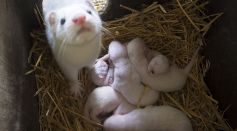ENVIRONMENT & CLIMATE

Mexico Sinkhole: Authorities Rule Out Water Pumping as Cause, Calls It 'A Natural Process'

Mr. Frosty Inspires Discovery: Leopard Geckos Got Bright Colors from Cancer Gene
Antelope Saiga Returns; Population of This Rare Species Increases
Marine Scientists Solve Mystery of Stranded Pelagic Red Crabs Ashore

A New Species of Thismia Calls Attention for Conservation of Fairy Lanterns

Shark Teeth Unearthed from Iron Age City of David, Fossil Dates from Late Cretaceous Period

Can Peanut Butter Contribute to Future Pandemics? Research Shows Link Between Palm Oil and Disease Outbreaks
Divers Encounter 26-Feet-Long Giant Sea Worms That’s Actually a Colony of Smaller Creatures

Mink Farms Will Be Banned in the US to Prevent Possible Coronavirus Mutation

First Tyrannosaurus Rex Exhibit Opens in the UK After 100 Years: Will It Solve the Feather-Scale Debate?
Redated Eruption of Eifel's Laacher See Volcano Confirmed, Brings Clarity to European Climate Shift
Mastodonts and Elephant Extinction: Real Cause Behind Decrease in Population Points to Global Climate

Impending Volcanic Eruptions Can Be Possibly Predicted Using Invisible Electrical Activity

Antarctica's New Heat Record Confirmed: UN Verifies High Temperature at 64.9 Fahrenheit
Most Popular

Ancient Interbreeding Between Neanderthals and Modern Humans Revealed

'Forever Chemicals' PFNA and PFOSA to Faster Biological Aging in Middle-Aged Men, Study Finds

Why Matter Exists Instead of Nothing: Exploring the Universe's Mystery of Matter vs Antimatter

PETA Condemns Viral Baby Monkey Punch's Zoo Conditions As IKEA's Stuffed Orangutan Toy Sells Out





